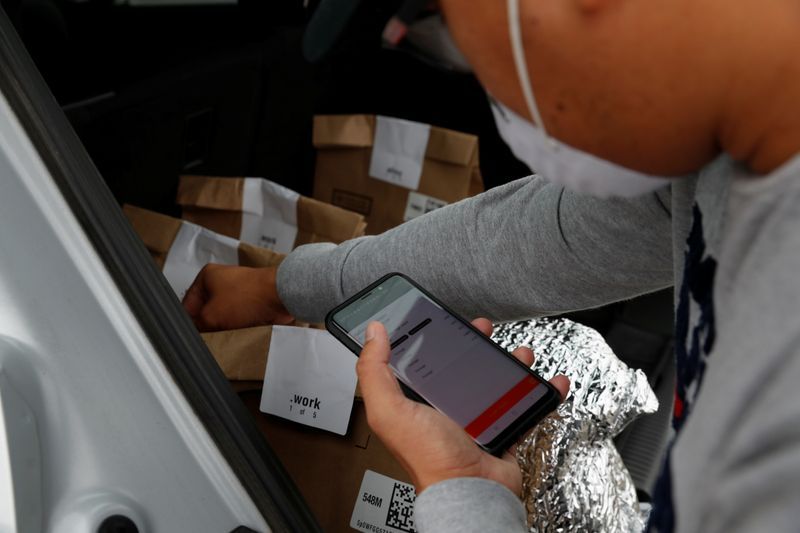
By Nathan Frandino and Shannon Stapleton
DUBLIN, Calif. (Reuters) – Excelso Sabulao delivers groceries for Amazon.com Inc in California so he can help provide his parents an income. Now, with endless interactions at stores and at homes during a pandemic, he worries his work will kill them.
“I’m just putting my faith in God that, you know, somehow while doing this, I’m going to be spared,” he said. “Once I get it, I’m going to spread it at home. And you know, it’s like bringing (a) death sentence to my parents.”
Sabulao, 35, is one of countless Amazon contractors shuttling food and staples that consumers depend on to their doorsteps, with nearly all of the U.S. population under government stay-at-home orders. Yet he and other drivers say they feel short-changed by Amazon for not giving them more pay or protections, as frontline workers in a global pandemic.
On Monday morning, Sabulao commuted about an hour to Dublin, a city in the San Francisco Bay Area, to pick up grocery orders from Amazon-owned Whole Foods. He lives in Stockton with his mother, who suffered a mild stroke three years ago, and his father, who is on a virus-related leave from Walmart Inc. For Sabulao, taking care of his parents – vulnerable to the effects of the coronavirus, he said – is part of Filipino culture.
Donning a white face mask, Sabulao towed two shopping carts overflowing with brown paper bags that were stamped with a logo for Amazon’s loyalty club Prime. He started loading his car in a parking spot for Amazon Flex, a program that lets contractors like himself sign up for delivery times with their own vehicles. He quickly filled up the trunk and began lining bags and other packages along the back seat of his car.
The harrowing part of the shift was over. What Sabulao had feared most, he said, was having to fetch those orders from the Whole Foods staging area where other drivers stood side by side, disregarding health officials’ recommendation to stay 6 feet (1.8 meters) apart. Sabulao had to open the same storage coolers that they did, and he generally has no time to use a wipe, he said.
“It’s making me paranoid,” said Sabulao. “You’re handling stuff that other people already put their hands into, and maybe if they have coughed – I don’t know.”
Amazon said gloves, masks and sanitizer are available at the Dublin Whole Foods store and across its facilities. “We remain committed to keeping our teams healthy and safe,” the company said, adding that it was requiring social distancing among staff and telling delivery workers to stay further apart from customers.
Sabulao took off his mask and started driving. At his destination, he scanned a code on grocery packages using his smartphone and took those to the shopper’s doorstep.
He has wanted to minimize customer contact as much as possible. Amazon’s app lets him text shoppers to inquire where to leave the items and share his estimated time of arrival.
Still, across 21 deliveries Monday, there was no avoiding face time. One woman was in her driveway when Sabulao arrived, so he put the groceries down next to her car. At another home, a customer opened the door, got on her knees and started wiping down the items she had ordered.
The work at times has been worth the trouble. Sabulao recalled how around the start of the pandemic, one shopper’s generous tip bumped his $10 pay up to $83 for a delivery that lasted less than 30 minutes. He earned $289 in over seven hours Monday, more than half of which came from tips. Earning $200 is typical for that amount of time, he said.
Increasingly he feels the reward is changing. Now rare surge pay for warehouse deliveries means he may make less than before, and he fears his personal supply of wipes will run out. He wishes Amazon would give him and other contractors sanitizer.
“We’re risking our lives, literally, risking our life delivering packages,” he said. But quitting is not an option.
“I have bills to pay. That’s it,” he said.
(Reporting by Nathan Frandino and Shannon Stapleton in Dublin, California; Writing and additional reporting by Jeffrey Dastin; Editing by Lisa Shumaker)





